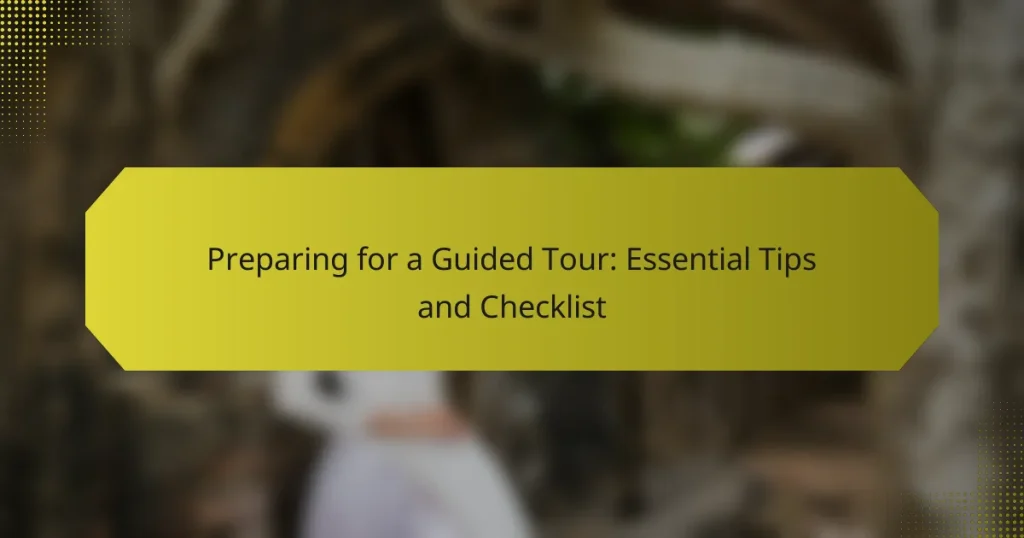Preparing for a guided tour can significantly enhance your travel experience, making it both enjoyable and memorable. By carefully selecting your packing items, understanding the tour itinerary, and being punctual, you can ensure a smooth journey. Essential items like comfortable footwear and appropriate clothing, along with a grasp of local customs, will help you engage fully with the experience.
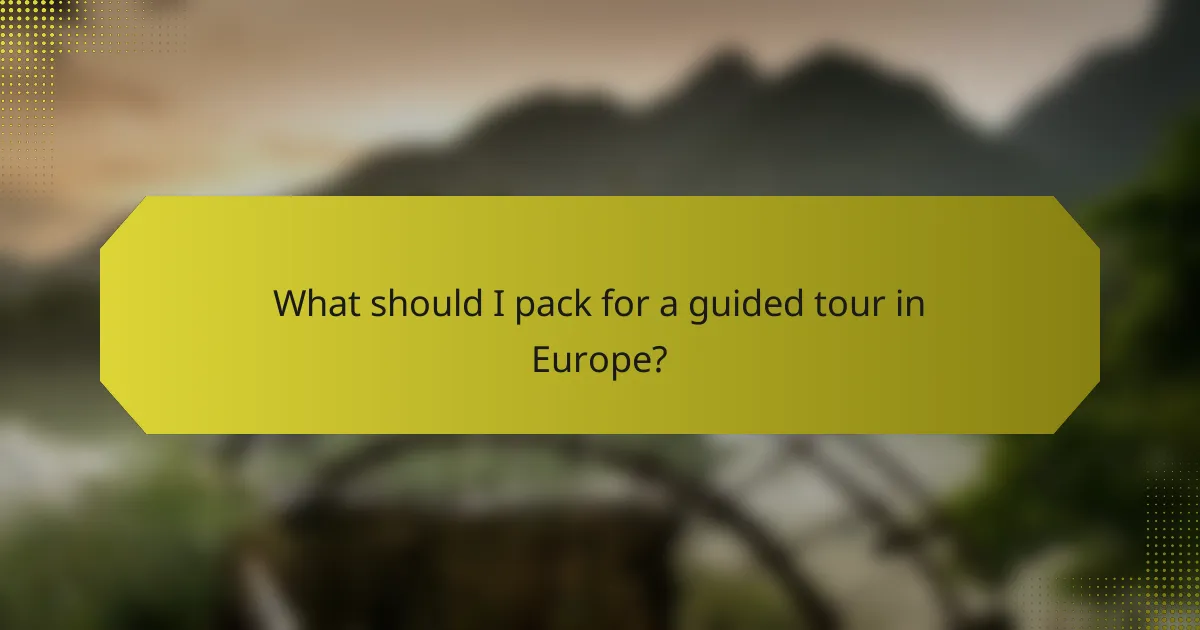
What should I pack for a guided tour in Europe?
Packing for a guided tour in Europe requires careful consideration of comfort and practicality. Essential items include comfortable footwear, suitable clothing for the weather, personal toiletries, a portable charger, and necessary travel documents.
Comfortable walking shoes
Comfortable walking shoes are crucial for a guided tour, as you will likely spend hours exploring on foot. Opt for shoes that provide good support and cushioning, ideally designed for walking or hiking.
Consider breaking in new shoes before your trip to avoid blisters. Look for options that are lightweight and breathable, especially if you’ll be touring during warmer months.
Weather-appropriate clothing
Weather-appropriate clothing is essential for enjoying your guided tour in Europe. Check the forecast for your travel dates and pack layers that can adapt to changing conditions.
Include a waterproof jacket, as rain can be common in many parts of Europe. Lightweight sweaters or cardigans are also useful for cooler evenings or air-conditioned spaces.
Travel-sized toiletries
Travel-sized toiletries help you maintain personal hygiene without taking up too much space in your luggage. Look for compact versions of your essentials, such as shampoo, conditioner, and body wash.
Remember to comply with airline regulations regarding liquids, typically limiting containers to 100ml and all items to fit within a single quart-sized bag.
Portable charger
A portable charger is vital for keeping your devices powered throughout the day. Guided tours often involve long hours away from charging points, making a portable charger a practical necessity.
Choose a charger with a capacity of at least 10,000mAh to ensure you can recharge your phone or tablet multiple times. Look for one that is lightweight and easy to carry.
Travel documents
Travel documents are essential for a smooth guided tour experience. Ensure you have your passport, any necessary visas, and copies of your itinerary and accommodation details readily accessible.
Consider using a travel wallet to keep your documents organized and secure. It’s also wise to have digital backups stored on your phone or in the cloud in case of loss or theft.
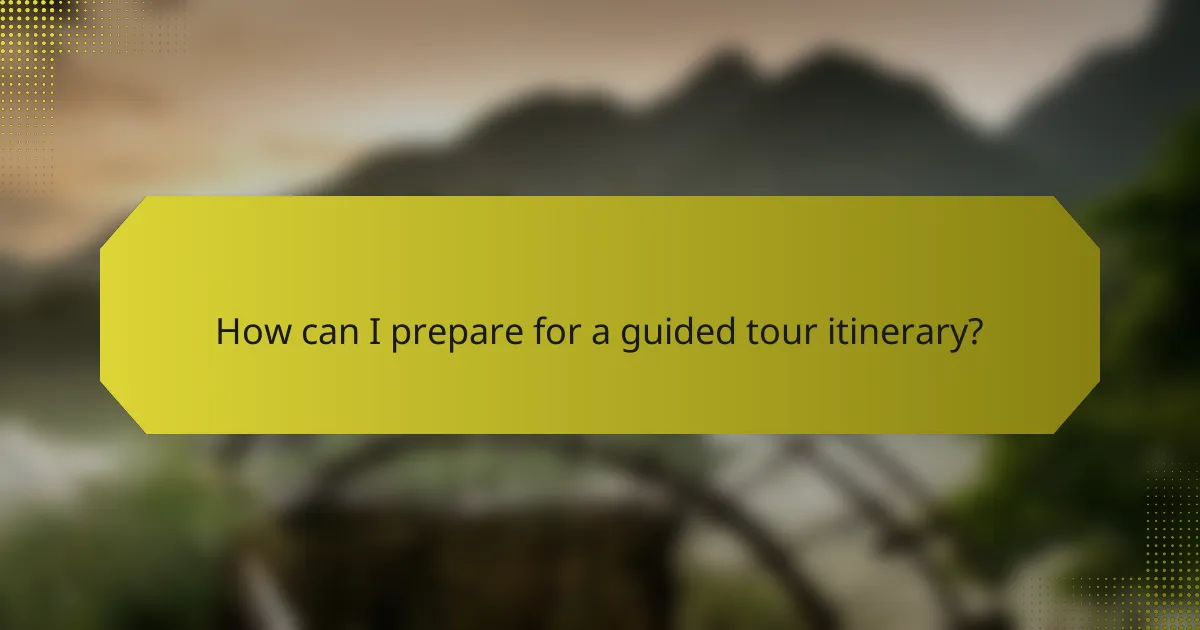
How can I prepare for a guided tour itinerary?
Preparing for a guided tour itinerary involves understanding the key elements of the tour, including highlights, daily schedules, and local customs. This preparation ensures a smoother experience and helps you make the most of your time during the tour.
Research the tour highlights
Identifying the main attractions and experiences included in your guided tour is crucial. Look for information on the tour provider’s website or travel forums to understand what to expect. This will help you prioritize your interests and manage your time effectively during the tour.
Consider making a list of the highlights that excite you the most. For example, if the tour includes historical sites, natural wonders, or local cuisine experiences, note these down to ensure you engage fully with each aspect of the itinerary.
Understand the daily schedule
Familiarizing yourself with the daily schedule of the tour is essential for effective planning. Most guided tours provide a detailed itinerary outlining the start and end times, as well as the duration of each activity. Knowing this information allows you to prepare accordingly, such as arranging meals or personal time.
Pay attention to any free time or optional activities mentioned in the schedule. This can be a great opportunity to explore on your own or participate in additional experiences that may not be included in the main itinerary.
Familiarize with local customs
Understanding local customs is important for a respectful and enjoyable experience during your guided tour. Research cultural norms, greetings, and dining etiquette specific to the region you are visiting. This knowledge will help you interact positively with locals and fellow travelers.
For instance, in some cultures, tipping practices may differ significantly. Knowing whether to tip and how much can prevent awkward situations. Additionally, being aware of dress codes for religious sites or local traditions can enhance your experience and show respect for the culture you are engaging with.
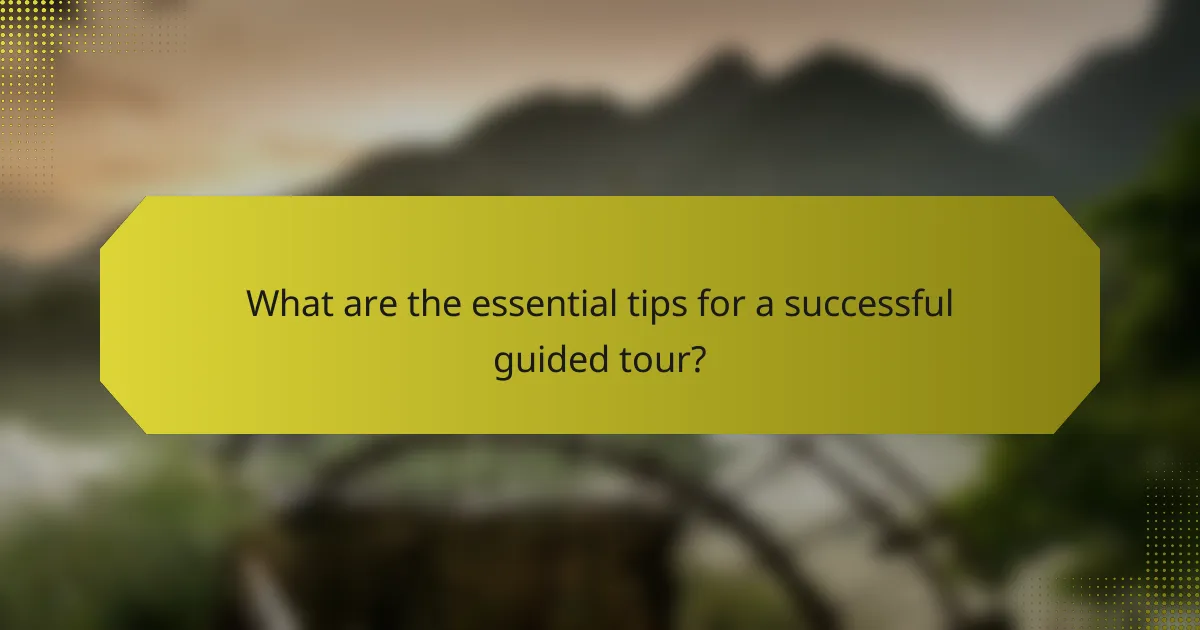
What are the essential tips for a successful guided tour?
To ensure a successful guided tour, focus on preparation, engagement, and punctuality. These elements enhance your experience and help you make the most of your time with the guide.
Stay hydrated
Staying hydrated is crucial during a guided tour, especially if it involves walking or outdoor activities. Carry a reusable water bottle and aim to drink water regularly, particularly in warm weather.
Consider the duration of the tour when planning your hydration. For tours lasting several hours, having at least 500 ml to 1 liter of water is advisable. This will help you maintain energy and focus throughout the experience.
Engage with the tour guide
Engaging with your tour guide can significantly enhance your understanding and enjoyment of the tour. Don’t hesitate to introduce yourself and express your interests, as this can lead to a more personalized experience.
Active participation, such as making eye contact and responding to questions, fosters a dynamic atmosphere. Remember that guides appreciate enthusiastic participants, which can lead to richer insights and stories during the tour.
Be punctual
Punctuality is essential for a smooth guided tour experience. Arriving on time ensures that you don’t miss important information and allows the group to stay on schedule.
Plan to arrive at least 10-15 minutes early, especially if the meeting point is unfamiliar. This buffer time can help you settle in and ask any last-minute questions before the tour begins.
Ask questions
Asking questions during a guided tour is encouraged and can deepen your understanding of the subject matter. Don’t hesitate to seek clarification or additional information about topics that interest you.
Consider preparing a few questions in advance based on the tour’s theme. This proactive approach can lead to engaging discussions and a more fulfilling experience for both you and your fellow participants.
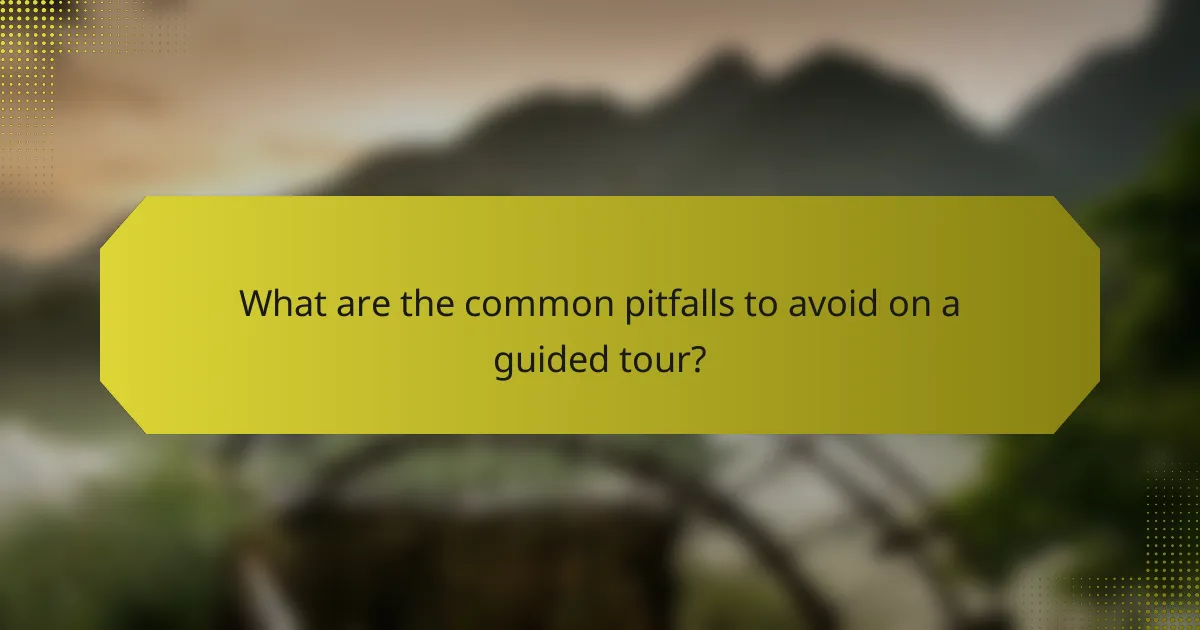
What are the common pitfalls to avoid on a guided tour?
Common pitfalls on a guided tour include overpacking, ignoring group dynamics, and neglecting personal safety. Being aware of these issues can enhance your experience and ensure a smoother journey.
Overpacking
Overpacking can lead to discomfort and inconvenience during a guided tour. Aim to pack only essentials, focusing on versatile clothing and necessary items to keep your load manageable.
A good rule of thumb is to limit your luggage to one medium-sized bag and a personal item. This helps you stay mobile and reduces the stress of carrying excess weight.
Ignoring group dynamics
Understanding group dynamics is crucial for a harmonious tour experience. Pay attention to the personalities and preferences of fellow travelers, as this can affect interactions and overall enjoyment.
Be open to collaboration and communication. Engaging with others can lead to shared experiences and make the tour more enjoyable for everyone involved.
Neglecting personal safety
Personal safety should always be a priority during a guided tour. Stay aware of your surroundings and follow the guide’s instructions to minimize risks.
Consider carrying a small first aid kit and familiarize yourself with emergency contacts in the area. Additionally, keep your valuables secure and be cautious in crowded places to avoid theft.
